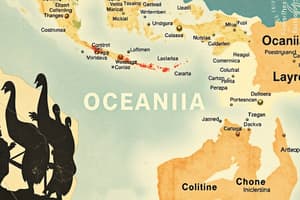Podcast
Questions and Answers
What is an Atoll?
What is an Atoll?
- A desert landscape
- A type of fish
- A volcanic mountain
- An island formed from coral (correct)
What is deforestation?
What is deforestation?
The removal of trees over a widespread area of land
What is a polyp?
What is a polyp?
A sea invertebrate that helps to create coral
What is pumice?
What is pumice?
What region does Micronesia refer to?
What region does Micronesia refer to?
All islands in Micronesia are formed from ancient volcanoes.
All islands in Micronesia are formed from ancient volcanoes.
What characterizes the climate in Micronesia?
What characterizes the climate in Micronesia?
Match the following islands with their descriptions:
Match the following islands with their descriptions:
Flashcards are hidden until you start studying
Study Notes
Vocabulary
- Atoll: An island formed from coral, typically characterized by a lagoon in the center.
- Deforestation: The widespread removal of trees, leading to habitat loss.
- Polyp: A small sea invertebrate instrumental in the creation of coral reefs.
- Pumice: A lightweight and porous rock formed from volcanic lava.
Micronesia
- Micronesia is located in the Pacific, bordered by the Philippines, New Guinea, Guam, and the Marshall Islands.
- The name Micronesia derives from Greek "mikros" (small) and "nesos" (island), reflecting the region’s numerous small islands.
- Major entities include the Federated States of Micronesia, Guam, Marshall Islands, Northern Mariana Islands, Wake Island, and Palau.
- The region features underwater mountain ranges; islands emerge from ancient volcanic activity.
- Coral atolls are formed when polyps grow on rocks, leaving behind coral as islands erode due to natural factors.
- Different islands have unique geological features:
- Guam: Coral limestone and sand composition.
- Federated States of Micronesia: Volcanic origins.
- Palau: Volcanic with extensive barrier reefs.
- Wake Island: Comprises three islands surrounding a lagoon.
Natural Resources in Micronesia
- Guam is the largest island in Micronesia at about 210 square miles, three times the size of Washington, D.C.
- Limited land results in few natural resources; forests are scarce.
- Fishing plays a vital role in the economy, along with deep-sea mining for minerals like oil and gas.
- The Marshall Islands have significant phosphate deposits, and Palau contains some gold deposits.
- Tourism, particularly from Japan, is crucial for the economy due to the appealing tropical climate.
Climate of Micronesia
- Micronesia experiences a tropical climate with heavy rainfall year-round and minimal temperature variation.
- The typhoon season runs from June to December, posing risks for infrastructure and requiring typhoon-proof building measures.
Melanesia
- Melanesia is situated north and northeast of Australia, bordered by Micronesia to the south and Polynesia to the east.
- The term Melanesia means "black island" in Greek and includes over a thousand islands like Papua New Guinea, Fiji, New Caledonia, and the Solomon Islands.
- The islands are predominantly volcanic; Papua New Guinea has several active volcanoes and shares a land border with Indonesia.
- This region endures frequent volcanic eruptions and earthquakes, impacting its geological landscape.
Studying That Suits You
Use AI to generate personalized quizzes and flashcards to suit your learning preferences.





